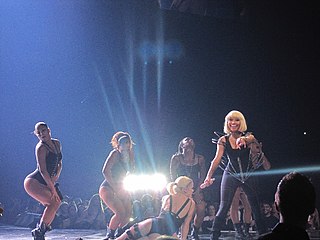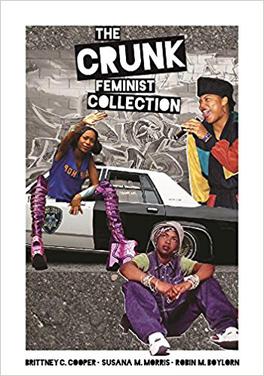
Dana Elaine Owens, better known by the stage name Queen Latifah, is an American rapper, actress and singer. She has received various accolades, including a Grammy Award, a Primetime Emmy Award, a Golden Globe Award, three Screen Actors Guild Awards, and two NAACP Image Awards, in addition to a nomination for an Academy Award. In 2006, she became the first hip hop artist to receive a star on the Hollywood Walk of Fame.

Gloria Jean Watkins, better known by her pen name bell hooks, was an American author, theorist, educator, and social critic who was a Distinguished Professor in Residence at Berea College. She was best known for her writings on race, feminism, and class. She used the lower-case spelling of her name to decenter herself and draw attention to her work instead. The focus of hooks' writing was to explore the intersectionality of race, capitalism, and gender, and what she described as their ability to produce and perpetuate systems of oppression and class domination. She published around 40 books, including works that ranged from essays, poetry, and children's books. She published numerous scholarly articles, appeared in documentary films, and participated in public lectures. Her work addressed love, race, social class, gender, art, history, sexuality, mass media, and feminism.

Patricia Hill Collins is an American academic specializing in race, class, and gender. She is a distinguished university professor of sociology emerita at the University of Maryland, College Park. She is also the former head of the Department of African-American Studies at the University of Cincinnati. Collins was elected president of the American Sociological Association (ASA), and served in 2009 as the 100th president of the association – the first African-American woman to hold this position.

Anna Julia Cooper was an American author, educator, sociologist, speaker, Black liberation activist, Black feminist leader, and one of the most prominent African-American scholars in United States history.
Black feminism is a branch of feminism that focuses on the African-American woman's experiences and recognizes the intersectionality of racism and sexism. Black feminism philosophy centers on the idea that "Black women are inherently valuable, that [Black women's] liberation is a necessity not as an adjunct to somebody else's but because of our need as human persons for autonomy."

Barbara Smith is an American lesbian feminist and socialist who has played a significant role in Black feminism in the United States. Since the early 1970s, she has been active as a scholar, activist, critic, lecturer, author, and publisher of Black feminist thought. She has also taught at numerous colleges and universities for 25 years. Smith's essays, reviews, articles, short stories and literary criticism have appeared in a range of publications, including The New York Times Book Review, The Black Scholar, Ms., Gay Community News, The Guardian, The Village Voice, Conditions and The Nation. She has a twin sister, Beverly Smith, who is also a lesbian feminist activist and writer.

A video vixen is a woman who models and appears in hip hop-oriented music videos. From the 1990s to the early 2010s, the video vixen image was a staple in popular music, particularly within the genre of hip hop. The video vixen first came around in the late 1980s when the hip-hop culture began to emerge into its own lifestyle, although was most popular in American popular culture during the 1990s and 2000s. Many video vixens are aspiring actors, singers, dancers, or professional models. Artists and vixens have been criticized for allegedly contributing to the social degradation of black women. Latinas are also degraded and hyper-sexualized in hip hop music videos because they are seen as objects of sexual desire in rap music videos.
Chickenhead is an American English slang term that is typically used in a derogatory manner toward women. The term mocks the motion of the head while performing oral sex on a man, but contains social characteristics and cultural relevance as well, and is frequently heard in popular hip hop music. More recent uses of the term have seen it taken back by hip hop feminists and entertainers as a symbol of sexuality and power. "Chickenhead" is also a term used in overseas sex trafficking for individuals that facilitate and monitor a person's transition into sex work.
Hip hop feminism is a sub-set of black feminism that centers on intersectional subject positions involving race and gender in a way that acknowledges the contradictions in being a black feminist, such as black women's enjoyment in hip hop music and culture, rather than simply focusing on the victimization of black women in hip hop culture due to interlocking systems of oppressions involving race, class, and gender.

HERESIES: A Feminist Publication on Art and Politics was a feminist journal that was produced from 1977 to 1993 by the New York–based Heresies Collective.
Misogynoir is a term referring to the combined force of anti-Black racism and misogyny directed towards black women. The term was coined by black feminist writer Moya Bailey in 2008 to address misogyny directed toward black transgender and cisgender women in American visual and popular culture. The concept of misogynoir is grounded in the theory of intersectionality, which analyzes how various social identities such as race, gender, class, age, ability, and sexual orientation interrelate in systems of oppression.
Joan Morgan is a Jamaican-American author and journalist. She was born in Jamaica and raised in the South Bronx. Morgan coined the term "hip hop feminist".
A "ride-or-die chick" is a neologism originating from biker culture, referring to a woman who is willing to support her partner and their risky lifestyle despite how this might endanger or harm her. She may even take an active role as an accomplice.
Feminist activism in hip hop is a feminist movement based by hip hop artists. The activism movement involves doing work in graffiti, break dancing, and hip hop music. Hip hop has a history of being a genre that sexually objectifies and disrespects women ranging from the usage of video vixens to explicit rap lyrics. Within the subcultures of graffiti and breakdancing, sexism is more evident through the lack of representation of women participants. In a genre notorious for its sexualization of women, feminist groups and individual artists who identify as feminists have sought to change the perception and commodification of women in hip hop. This is also rooted in cultural implications of misogyny in rap music.
Queer of color critique is an intersectional framework, grounded in Black feminism, that challenges the single-issue approach to queer theory by analyzing how power dynamics associated race, class, gender expression, sexuality, ability, culture and nationality influence the lived experiences of individuals and groups that hold one or more of these identities. Incorporating the scholarship and writings of Audre Lorde, Gloria Anzaldúa, Kimberlé Crenshaw, Barbara Smith, Cathy Cohen, Brittney Cooper and Charlene A. Carruthers, the queer of color critique asks: what is queer about queer theory if we are analyzing sexuality as if it is removed from other identities? The queer of color critique expands queer politics and challenges queer activists to move out of a "single oppression framework" and incorporate the work and perspectives of differently marginalized identities into their politics, practices and organizations. The Combahee River Collective Statement clearly articulates the intersecting forces of power: "The most general statement of our politics at the present time would be that we are actively committed to struggling against racial, sexual, heterosexual, and class oppression, and see as our particular task the development of integrated analysis and practice based upon the fact that major systems of oppression are interlocking. The synthesis of these oppressions creates the conditions of our lives." Queer of color critique demands that an intersectional lens be applied queer politics and illustrates the limitations and contradictions of queer theory without it. Exercised by activists, organizers, intellectuals, care workers and community members alike, the queer of color critique imagines and builds a world in which all people can thrive as their most authentic selves- without sacrificing any part of their identity.

The Crunk Feminist Collection is a collection of essays that take on intersectionality, African-American culture, patriarchy, misogyny, anti-blackness and hip hop feminism. The essays were originally published on the blog Crunk Feminist Collective between 2010 and 2015. Edited by Brittney Cooper, Susana M. Morris and Robin M. Boylorn, three members of the Crunk Feminist Collective (CFC), the book was published in 2017 by Feminist Press.
The lack of respect that black women received in the music industry gave rise to hip-hop feminism, as singers such as Monie Love brought attention to the differences in acknowledgment that exist even for equal talent. The movement tackles problems arising from deindustrialization, racial wealth disparities, and conservative backlash. It was molded by the social environment of the 1980s and 1990s. Me'Shell Ndegeocello an American rapper, singer and bassist and Angie Stone a singer are two artists that have shaped the conversation. Hip-hop feminism goes beyond gender issues to support the rights of women, African Americans, and LGBTQ+ people. Prominent figure in the genre Queen Latifah used "the politics of respectability" to promote women's rights and racial empowerment. Ndegeocello is one of the rising queer feminists of color who brings a nuanced viewpoint to problems like abortion and unjust beauty standards. Changes in perspectives are reflected in the transition from male-dominated hip-hop to women-centered hip-hop soul, which allows for a diversity of narratives within black communities. The Grammy-winning song "U.N.I.T.Y." by Queen Latifah was a historic moment that validated the powerful voice of black women in a male-dominated field and sparked discussions about domestic abuse and the commodification of black women's sexuality. In the United States, the introduction of new styles of music came during the Transatlantic Slave Trade era. The genres of music include, but are not limited to, blues, rock, gospel music, jazz, bluegrass, and Hip-hop. African American women in the music industry have made significant contributions over the years.
Feminism of the 99% is a contemporary, grassroots, radical feminist movement, which recognises intersectionality and advocates activism for and by all women - including those who have been overlooked by other feminist movements. It was proposed by a collective of prominent American feminists in an appeal published in Viewpoint Magazine in February 2017, and built upon the mobilisation of women seen in the 2017 Women's March in January. The appeal simultaneously called for an International Women's Strike on 8 March 2017. It is a successor to the accumulated intellectual legacy of feminist movements such as radical feminism, Marxist feminism, Black feminism and transnational/decolonial feminism, and asserts that gender oppression is not caused by a single factor, sexism. They insist that it is rather a multifaceted product of the intersections of sexism, racism, colonialism and capitalism.
Ratchet feminism emerged in the United States from hip hop culture in the early 2000s, largely as a critique of, and a response to, respectability politics. It is distinct from black feminism, womanism, and hip hop feminism. Ratchet feminism coopts the derogatory term (ratchet). Other terms used to describe this concept include ratchet womanism as used by Georgia Tech professor Joycelyn Wilson or ratchet radicalism used by Rutgers professor Brittney Cooper. Ratchet is an identity embraced by many millennials and Gen Z black women and girls. The idea of ratchetness as empowering, or of ratchet feminism, has been articulated by artists and celebrities like Nicki Minaj, City Girls, Amber Rose, and Junglepussy, scholars like Brittney Cooper and Mikki Kendall, and through events like Amber Rose's SlutWalk. Many view ratchet feminism as a form of female empowerment that doesn't adhere to respectability politics.
Dr. Gwendolyn D. Pough (1970s) is an American academic and scholar in rhetoric and composition studies. She is a post-Civil Rights African-American academic who developed as a writer during the rise of hip-hop culture.








